One family’s bold move from Wellington to rural Katikati launched a multi-generational organic market garden business that’s having a positive impact on their health and the Earth.
Gro My Goodness director, Georgia Illston, says it was the Covid lockdown that sparked a desire to get out of the capital to live in a more mindful way.
“I was working in a gym, coaching cheerleading squads,” she says. “It was dad who initially saw YouTube videos on organic gardening and my parents, my sister and our partners all agreed to sell the family home in Seatoun and find a lifestyle block that we could live on together.”
The family looked in Wairarapa and around the BOPy before finding the 1.5-hectare piece of land at Tuapiro Point, 10 minutes north of Katikati.
“My partner (now husband) Jared and I were the last to arrive in October 2020,” says Georgia. “Without even seeing the property, we packed up our car and drove up. It’s lovely here. We have water glimpses and great views of the Kaimai ranges. Sometimes we all just stand outside and watch the sun set.”
Starting from scratch
Georgia started creating the market garden from scratch, and in January 2021 took a weekend course to kick-start her knowledge of horticulture.
“We used cardboard to smother the lawn and then added layers of compost,” she says. “It wasn’t until September last year that I decided to quit my part-time job and have a go at running the business full time.”
The garden is now around 600sqm, providing fresh produce to organic stores in Thames and Waihi as well as Falls Retreat restaurant and local farmers markets.
Protecting the earth
Georgia’s philosophy revolves around growing healthful salad greens that don’t strip the earth.
“As a family, we knew going into it that we wanted to do this on a small scale to provide food that’s healthy for people and good for the planet,” she says. “We’re working in a regenerative way, with no-dig, spray-free organic practices.”
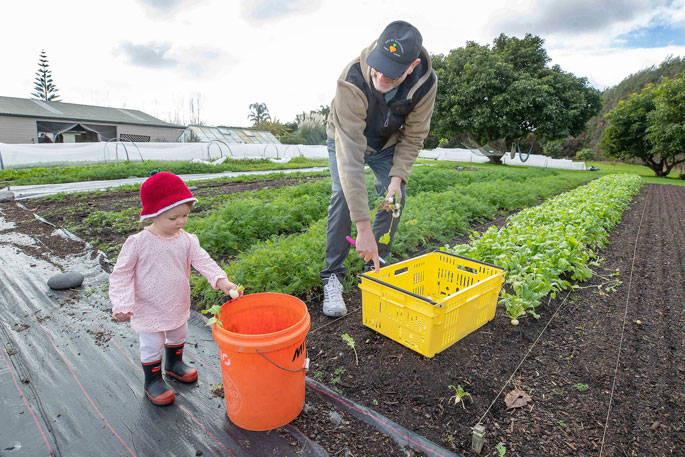 Richard de Groen showing Arabella Mather where to put their harvest. Photo: John Borren.
Richard de Groen showing Arabella Mather where to put their harvest. Photo: John Borren.
That means no heavy machinery to till the soil; everything is done by hand.
“There’s a belief that conventional methods using tractors are damaging to the soil,” says Georgia. “We have a tool called a tilther and a fork so that we’re never digging too deep in those garden beds which helps preserve the biology of the soil. There are millions of microorganisms so when you dig, you’re destroying them. We work hard to take care of them.”
Georgia says the practice also helps to keep weeds to a minimum.
“By not disturbing weed seeds they’re not needed, so weeds don’t grow,” she says. “They’re there for a purpose: to provide structure and food for microorganisms, so if you leave them alone, it’s best for the soil.”
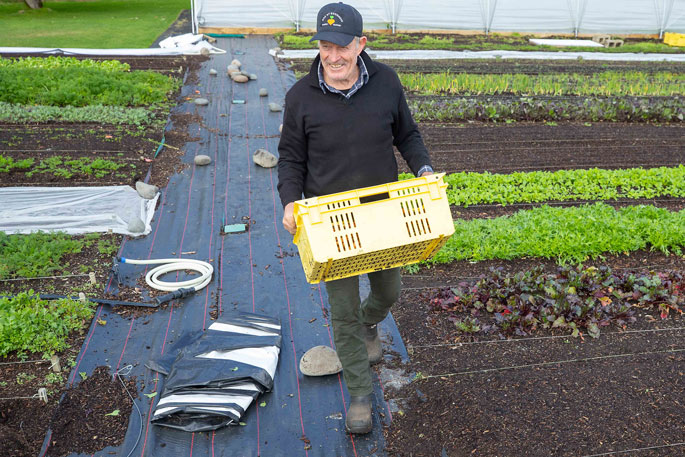 Georgia’s uncle Jon de Groen helping out. Photo: John Borren.
Georgia’s uncle Jon de Groen helping out. Photo: John Borren.
Georgia practices cover cropping which makes full use of the garden beds all year round.
“We grow around ten to fifteen different crops – mostly salad greens and baby root vegetables – and we try to rotate plants straight after each harvest so they’re absorbing different nutrients. Our soil also has a low pH level, so we add lime and organic fertilisers.”
What an average day looks like
An average day sees the 28-year-old up early to harvest, then wash and pack in time to make deliveries in the afternoons.
“If I’m not harvesting, I’ll be flipping beds and getting them prepped to be planted again,” says Georgia. “A lot of what we produce is very fast growing. If there’s a large order to fill, I’ll get dad to come help me with it. He intends to be more involved after he retire.”
When she reflects on how different life is in rural Katikati compared to living in the city, Georgia couldn’t be happier.
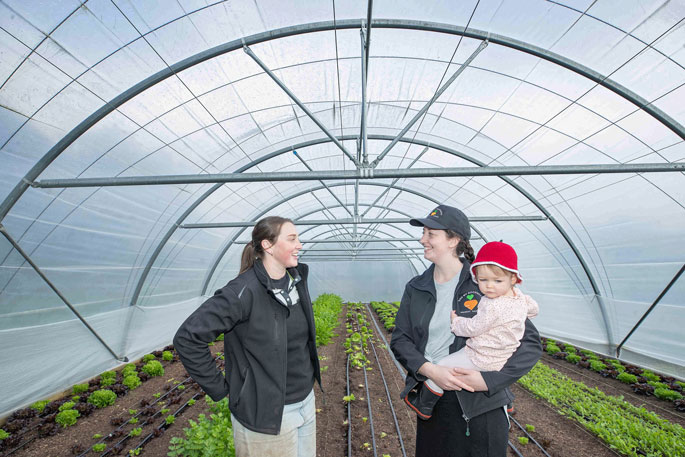 Georgia Illston, left, with her sister Gabrielle Mather and Arabvella Matha. Photo: John Borren.
Georgia Illston, left, with her sister Gabrielle Mather and Arabvella Matha. Photo: John Borren.
“I definitely eat differently to how I used to,” she says.
“I love days when I’m working and listening to music and if there’s a whole bed of lettuce to plant, it takes a while but it’s satisfying. Talking to customers and getting to know people who come to our stall at the markets is nice. I love the conversations it creates; from people talking about how eating organic has helped them health-wise to how they use our produce in recipes.”
Family
Her sister Gabi Mather is head flower grower; selecting the varieties to plant as seeds all the way through to harvesting and arranging them into bouquets for market. She then works the stalls along with her 16-month-old, Arabella.
“Gabi’s been bringing my niece to markets since she was a few weeks old, so our regular customers and other stallholders are watching her grow up,” laughs Georgia.
“She’s just starting to walk and already loves eating avocados and waving at customers.”
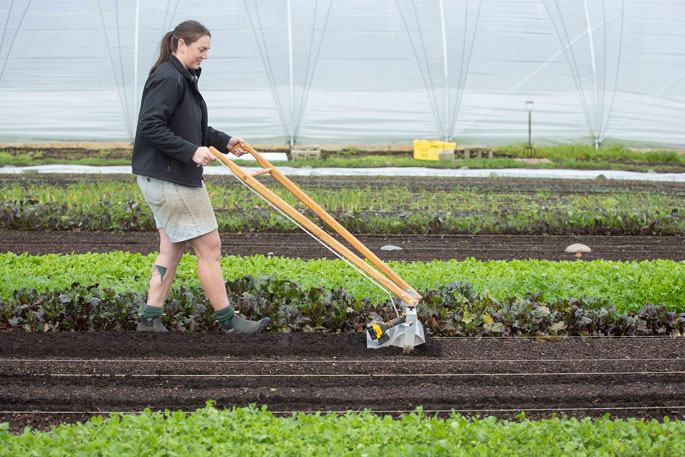 Georgia Illston working the land. Photo: John Borren.
Georgia Illston working the land. Photo: John Borren.
So, four years after her father was first inspired by an instructional video, Georgia now shares her knowledge and sustainable practices online with more than 3000 followers.
“Having the YouTube channel adds another layer of diversity to the business,” she says.
“Making videos helps me to tell my story and connect with people all over the world. My generation is very aware of issues we’re facing when it comes to climate change so having a positive impact on the Earth is the least we can do.”

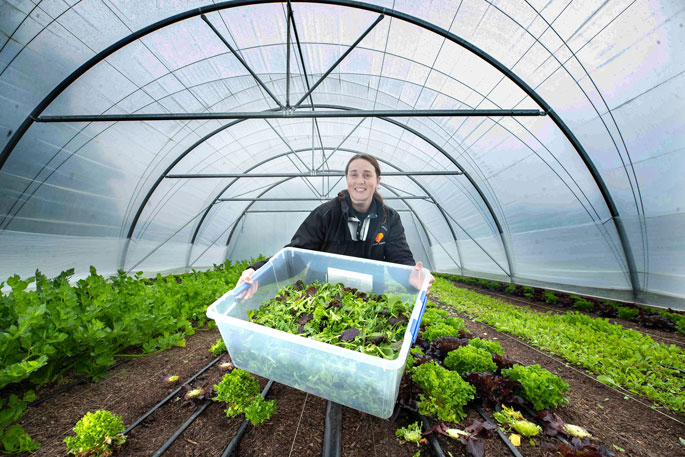

0 comments
Leave a Comment
You must be logged in to make a comment.